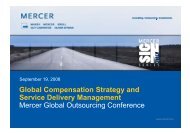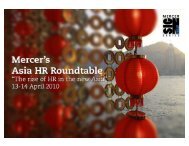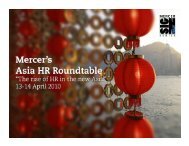A SERIES OF ARTICLES FRoM THE 2011 EMEA CoMPENSATIoN ...
A SERIES OF ARTICLES FRoM THE 2011 EMEA CoMPENSATIoN ...
A SERIES OF ARTICLES FRoM THE 2011 EMEA CoMPENSATIoN ...
You also want an ePaper? Increase the reach of your titles
YUMPU automatically turns print PDFs into web optimized ePapers that Google loves.
GLOBAL COMPENSATION AND BENEFITS: WHAT’S WORKING<br />
<strong>THE</strong> MIDDLE EAST: MODEST INCREASES FOR<br />
MOST EMPLOYEES<br />
Employers across the Middle East are forecasting pay<br />
increases averaging 7.6%. Dramatic increases are<br />
anticipated in countries such as Pakistan (15%) and<br />
Yemen (10%–13%). Companies in Israel (3.0%–3.5%)<br />
are forecasting the lowest increases in the region,<br />
followed by Bahrain (4.5%–5%), Saudi Arabia (6%),<br />
Qatar (5.5%–6%) and Kuwait (6%).<br />
In the United Arab Emirates’ unique labour market<br />
structure, nearly 80% of employees are expatriates<br />
who typically work in the region for three to five<br />
years. These employees are highly engaged, and cash<br />
is the most attractive element. Emirati employees<br />
value cash as well, but they also view the following<br />
elements as important: employer brand, job title,<br />
career development, respect, and a work environment<br />
that respects religious and social commitments.<br />
For example, the employer brand should have high<br />
recognition locally and nationally, and working for<br />
such an employer should be seen as prestigious. As a<br />
result, governments and companies with strong local<br />
brands are seen as employers of choice.<br />
AFRICA: LARGE VARIATIONS IN PAY INCREASES<br />
This area has the largest variation in forecasted pay<br />
increases due to the diverse nature of the region and<br />
the limited number of multinationals. Companies<br />
in Algeria are forecasting increases of 6.9%–7.3%,<br />
surpassed by forecasts from South Africa (7.4%–7.8%),<br />
Kenya (8%–8.8%), Nigeria (10%) and Uganda<br />
(10%–11%). Besides base salary, employers offer cash<br />
allowances,13th-month cheques and fringe benefits.<br />
Social security benefits are based on contributions, with<br />
varying levels of benefit where applicable, and medical<br />
provisions are offered mostly for employees, spouses<br />
and some dependants.<br />
As for retirement funding, cross-border portable funds<br />
are a big challenge. There is a growing recognition<br />
of the value of nonguaranteed schemes. Company<br />
car allowances are extremely appreciated, and so is<br />
the option to buy the car from the company at a price<br />
below market value. Nonfinancial benefits meant<br />
to improve employees’ lifestyles vary from market<br />
to market but are highly valued. As an example,<br />
in Nigeria, employees are offered home electricity<br />
generators and related maintenance as a precious<br />
benefit.<br />
Africa’s growth and opportunities require highly skilled<br />
talent and engaged workforces, but challenges for<br />
employers and HR are numerous, from attraction<br />
and retention to remuneration management skills<br />
development and HR management competencies<br />
(hampered by accelerated mobility). There is growing<br />
emphasis on job evaluation and grading to facilitate<br />
mobility at senior levels across borders.<br />
According to Mercer’s survey, 2012 salary<br />
increases in the fast-moving consumer goods,<br />
high-tech, nondurable and service industries<br />
are forecast to be in line with those in the<br />
general market, while, on average, forecasted<br />
salary increases are typically higher in the<br />
finance/banking and energy sectors. Salary<br />
increases are expected to be below general<br />
market in the durable and manufacturing<br />
industry.<br />
ASIA PACIFIC: A BRIGHT SPOT<br />
Asian optimism is generated primarily by China’s huge<br />
economy and resources, and innovation is the source<br />
of growth and talent development. Multinationals<br />
are facing increased competition from local firms and<br />
should react with agility to the fast-moving changes<br />
in the local market. Local organisations have stopped<br />
looking at Western organisations for best practices<br />
and are trying completely new ways to get their<br />
workforces to perform at the highest productivity<br />
levels.<br />
Asian employers focus on presenteeism 2 and the role<br />
of the quality of leadership in raising engagement<br />
levels. In Asia, many people work for an individual –<br />
a leader – before working for a company. While<br />
Western managers tend to judge Asian managers<br />
relative to Western standards, they should be aware of<br />
local culture and the impact of their behaviour: Asian<br />
managers may not talk much in formal meetings, but<br />
they deliver. Top executives in China are receiving<br />
greater remuneration than their global headquarters<br />
leaders in Europe, and this should no longer be<br />
viewed with surprise, since they are the ones who<br />
are delivering growth. Training and development are<br />
of special importance to employees in China, with<br />
12<br />
2<br />
While “presenteeism” is often defined as attending work while sick, scholars have provided various other descriptions of the concept. For instance,<br />
Simpson (1998) claimed that presenteeism is “the tendency to stay at work beyond the time needed for effective performance on the job”. Presenteeism<br />
could therefore be considered an act of supreme engagement and organisational citizenship.
















